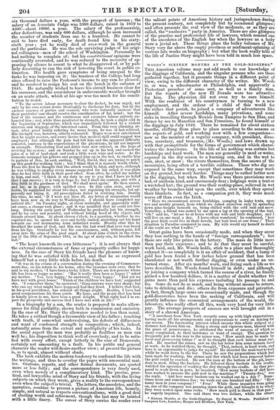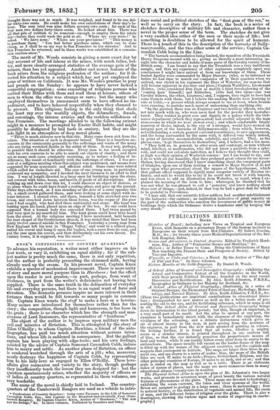WOODS'S SIXTEEN MONTHS AT THE GOLD-DIGGINGS. * THIS American volume may
not add much to our knowledge of the diggings of California, and the singular persons who are there gathered together, but it presents things in a different point of view, owing to the different character of the writer. Mr. Woods is, or was, a schoolmaster at Philadelphia, and apparently a Protestant preacher of some sect, as well as a family man. But the reports of the new El Dorado were too attractive for him. The physician did not even try to cure himself. With the readiness of his countrymen in turning to a new employment, and the ardour of a child of this world for the riches that perish, he joined a company of adventurers like himself. After severe hardships, many privations and some risks in travelling through Mexico from Tampico to San Bias, and thence by sea to Mazatlan and San Francisco, he found himsef at the diggings in July 1849. There he remained for about sixteen months, shifting from place to place according to the seasons or the reports of gold, and, working now with a few companions— now as the member of a regular company, with president, direc- tors, secretary, and treasurer, (Mr. Woods,) and laws drawn up with that promptitude for the forms of government which charac- terizes the Americans. In this life of his nothing was certain but hardships and hard work. The men are generally in mud or water, exposed in the dry season to a burning sun and in the wet to rain, sleet, or snow ; the rivers themselves, from the snows of the mountains, being often of a terrible coldness. Those who dig are exposed in the same way, except that sometimes they may work on dry ground, but work harder. Things may be rather better now in the diggings, but when Mr. Woods was there provisions were bad, of uniform kind, and enormously dear ; lodgings were a tent or a wretched hut; the ground was their resting-place, relieved in wet weather by branches laid upon the earth, over which they spread their blankets. In fact, as a companion put it, they were much worse off than even the Irish.
"Here we encountered severe hardships, camping in leaky tents, upon wet and muddy ground, from which we raised ourselves only by spreading down pine-boughs beneath us, being chilled with the cold rain and snow. Yesterday, a friend was seated by me upon a log at the opening of the tent. Oh I,' said he, let me be at home with my wife and little daughter, and I will live on one meal a day. I have often wondered,' he continued, how the poor Irish could live in their hovels, but look here at our home ! Their situation is Paradise compared to ours. My wife would cry herself to death if she could see what I suffer.'" Great gains have been occasionally made, and when they occur they lose nothing in the hands of "foreign correspondents " ; but these are only like prizes in the lottery. The mass do little more than pay their expenses ; and to do that they must be careful, work -hard, and, Mr. Woods holds, stick to a place and thoroughly exhaust it—so completely is it an affair of accident, that a lump of gold has been found a few inches below ground that has been abandoned as not worth further digging, or even under an un- turned stone. After six months' work, and living such a life as we have described, Mr. Woods found himself in debt; and although, by joining a company which turned the course of a river, he finally gained a few hundred dollars, it is a matter of doubt whether his gains more than paid his expenses including his passage to and fro. Some do not do so much, and being without means to return, take to drinking and die ; others die from exposure and privation. In fact, though large sums are occasionally made, and though the gold-discoveries have been the making of California, and will greatly influence the economical arrangements of the world, the labourers who really effect all this, work very hard for very little pay. The average prospects of success are well brought out in a story of a shrewd American.
"A merchant from'New York recently came up with high expectations, having made all his arrangements and preparations to carry on inking for one season. The fascinating interest which invests this whole subject at a distance had drawn him on. Being a strong and vigorous man, blessed with the grace of perseverance, he attributed the want of success, of which so many complained, to their indolence or want of energy. The question he frequently put on his way to the mines was How much may be made by hard and persevering labour ?' as if he thought that such labour must suc- ceed. He reached the mines, saw on the bar below him some miners hard at work. As he watched them, he thought, That, indeed, is hard work, and here is an opportunity to judge for myself.' He directed the muleteer to wait while he went down to the bar. There he saw the preparations which had been made for washing, the stones and dirt which had been removed before the gold could be reached. He saw the men at the bottom of the pit, knee- deep in mud, filling the buckets. He followed those buckets to the cradle, watched the operation of washing the dirt through the cradle. As they pre- pared to wash down in pans, he inquired, 'How many buckets of dirt have been washed to procure the gold now in the machine ?" Twenty-five,' was the reply. And how many buckets can be washed out in a day ?' Some- times more and sometimes less ; we wash out one hundred and fifty.' How many men in your company?' ' Four.' While these inquiries were going on, one of the company was panning down the gold, and brought it to where they were seated upon some rocks. How much gold is there in that pan?' he eagerly inquired. One said there was two dollars, while the others • Sixteen Months at the Gold-Dirgings. By Daniel B. Woods. Published bY Sampson Low, London; Harper and Brothers, New York. thought there was not so much. It was weighed, and found to be one dol- lar sixty-two cents. He could make his own calculations of their day's la- bour. The sum total was nine dollars seventy-two cents; for each of the four men two dollars forty-three cents. He looked about him. There was all that pile of rubbish to be removed—enough to employ them the whole day—before they could wash the gold at all. Where are your tents ? ' he asked. We have none.' 'Where are your provisions ? " This money is to purchase them.' 'You had better purchase mine, which can be done cheap, as I shall be on my way to San Francisco in ten minutes.' And to
an Francisco he returned, and in three weeks was established in a commis- sion auction-store."
The merit of Mr. Woods consists in giving a more exact day by day account of life and labour at the mines, with much fuller, bet- ter, and more clearly-arranged statistics of the average gain of the miners, than has yet appeared. Another and newer feature of the book arises from the religious profession of the author; for it di- rected his attention to a subject which has not y'et employed the pens of writers on California. It was Mr. Woods a practice to pray and preach on the Sunday: he appears to have never lacked a respectful congregation ; some consisting of religious persons who carried their Bibles with them and read them at leisure, others of men to whom the office was strange or rare; but the many who employed themselves in amusement seem to have offered no im- pediment, and to have behaved respectfully when they chanced to be present. This religious feeling is the only thing that sheds the least ray over the worldly objects, the debauchery, frauds, and cozenings, the intense avarice and the reckless selfishness of San Francisco. The meetings alluded to in the following extract might in a measure be prompted by Exeter Hall habits, and might possibly be disfigured by bad taste in oratory, but they are the sole light in an atmosphere of deep moral gloom. "There is much sickness now in this city. Many come down sick from the mines. The situation of such is desperate indeed. There is a heartless un- concern in the community generally to the sufferings and wants of the many who are dying wretched deaths in the midst of them. It may not, perhaps, be possible that it should be otherwise. Every man is too much occupied with his own concerns to be able to search out objects of charity ; and there are so many such cases constantly recurring, as to induce a feeling of in- difference, the result of familiarity with the sufferings of others. I was pre- sent at a religious meeting when this subject was mentioned, and means were suggested for some systematic and efficient relief. Some cases were related which called for immediate aid. The case of one young man, in particular, awakened my sympathy, and I devoted the next forenoon to an effort to find him. I was at length 'directed to a large open lot bordering upon the shore, and covered with bales, boxes, and barrels of goods of all descriptions. After walking up and down over this lot, I could discover no object of distress, or no place where he could have found a resting-place, and gave up the pursuit. Three days afterward, as I was standing at the door of a store opposite this lot, a small crowd gathered there, and were looking at some object with in- tense interest. I crossed over, and there, beneath a hide stretched over two boxes, and crouched down between these boxes, was the corpse of the poor man I had sought, who had died there unfriended and alone. His head was leaning upon his hand, placed upon an edge of the box. No one could have supposed that a human body was concealed there. I had twice passed by that very spot in my search for him. The least groan could have been heard from the street. At the religious meeting I have mentioned, held beneath the tent chapel of the Presbyterian church, it was stated that there had been lately twelve cases of suicide in San Francisco. Yesterday a young man from New England left his tent in 'Happy Valley,' and went to a retired place, untied Ins cravat and hung it upon the bushes, took a razor from its case, and put the case upon his cravat, and then deliberately cut his own throat. Pe- cuniary losses, it in supposed, was the cause."



























 Previous page
Previous page